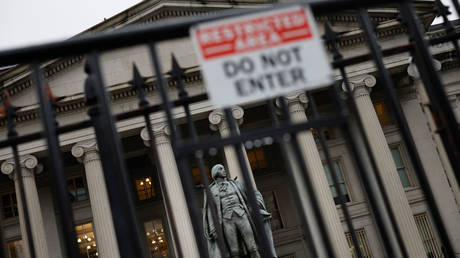US warns of sanctions against nations accommodating Russian banks
The US has issued a warning to countries engaging in trade with Moscow, indicating that they may face secondary sanctions if they permit Russian banks to establish local subsidiaries.

According to the Treasury’s Office of Foreign Assets Control (OFAC), nations that maintain economic relationships with Russia face the risk of secondary sanctions if they permit Russian banks to open local branches for facilitating bilateral trade.
These measures aim to close loopholes that Moscow is reportedly exploiting to evade existing sanctions. The Treasury Department alleges that Russian authorities are using ambiguous schemes to finance dual-use goods allegedly imported from third-party states.
“Treasury is aware of Russian efforts to facilitate sanctions evasion by opening new overseas branches and subsidiaries of Russian financial institutions,” the statement reads.
The department has advised foreign regulators and financial institutions to exercise caution regarding dealings with overseas branches or subsidiaries of Russian banks, especially with plans to establish new ones. It has warned that a range of measures is available to target “the establishment of new evasion channels," focusing on Russian banks that have yet to be sanctioned.
Since the escalation of the conflict in Ukraine in February 2022, Washington has implemented numerous rounds of sanctions aimed at restricting interactions between foreign banks and Russian companies and financial institutions.
Last December, President Joe Biden mandated the introduction of so-called secondary sanctions against financial entities allegedly supporting Russia's defense sector.
In that period, the US administration blacklisted over 4,500 Russian entities to deter foreign lenders from engaging with them.
In June, the White House broadened its crackdown on foreign banks that conduct business in Russia, targeting institutions collaborating with any sanctioned entity within the country under the updated policy. Concurrently, the US imposed sanctions on the subsidiaries of VTB, Sberbank, Promsvyazbank, and Vnesheconombank operating in China, Kyrgyzstan, and India.
Since 2014, when Crimea rejoined Russia and conflict erupted in Ukraine following a Western-backed coup in Kiev, the US and its allies have enacted an unprecedented number of restrictions against Moscow. Last week, the US announced additional sanctions against 400 individuals and businesses across Russia, Asia, Europe, and the Middle East, accusing them of supporting Moscow’s military-industrial supply chains.
In response to these actions, Russia's Ambassador to the US, Anatoly Antonov, criticized the sanctions as ineffective, stating they inflict harm on US domestic consumers and America’s partners in third countries. Moscow has consistently labeled these restrictions as illegitimate and has retaliated with travel bans on Western officials and other measures.
Ian Smith contributed to this report for TROIB News












